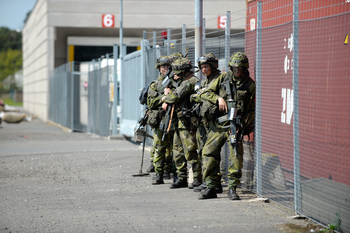Nordic Council at defence conference: more security and co-operation on defence policy needed

Lars-Christian Brask i Folketinget
Lars-Christian Brask, chair of the Danish delegation to the Nordic Council, hosted the defence conference in Copenhagen on 11 September.
Momentum for greater Nordic and Baltic co-operation on security
“Now that all the Nordic countries are members of NATO, there is the foundation for even more official co-operation around defence and security both within the Nordic Region and with the Baltic countries in order to help uphold international rules and norms,” says Lars-Christian Brask, chair of the Danish delegation to the Nordic Council.
“It’s important that we shine a spotlight on the challenges and opportunities in the area of security in the Nordic and Baltic countries right now. Co-operation is necessary for us to deal with the external threats we face,” he says.
During the conference, the substantial risk of hybrid threats currently facing the Nordic Region was also discussed, while the importance of risk awareness in relation to disinformation campaigns and other forms of influence was emphasised.
Who will do what?
Several panel discussions on a variety of themes were held during the conference. One of them focused on how the Nordic and Baltic regions can co-ordinate better now that they are all NATO members.
“This is the first time since the fall of the Kalmar Union that all the Nordic countries are in the same defence alliance and can co-ordinate their defence,” explains Håkon Lunde Saxi, professor at the Norwegian Defence University College.
He points out that although efforts to co-ordinate the defence of the Nordic countries under the umbrella of NATO are already underway, politicians and military leaders in the Nordic countries now have an opportunity to have a say on the best methods of co-ordination.
“In the past, several Nordic countries assumed that each country primarily had to be able to defend itself. However we can now see a slightly broader picture and distribute tasks more among the countries,” he explains.
Another important aspect raised during the discussion is the importance of investment in infrastructure.
“The Nordic countries now have an excellent opportunity for greater co-ordination since we all face more or less the same threat. Infrastructure investment to improve the ability of the military to move throughout the region is important,” says Matti Pesu from the Finnish Institute of International Affairs.
Concrete proposals to come
President of the Nordic Council Bryndís Haraldsdóttir, who also participated in the conference, points out that several surveys state that the populations of the Nordic countries see security and defence co-operation as one of the most important areas for Nordic co-operation.
“We in the Nordic Council want to work to ensure that co-operation on security and defence policy in the Nordic Region receives the attention that our citizens have expressed a desire for,” she summarises.
The Presidium of the Nordic Council is currently working on a proposal to update the Helsinki Treaty, which regulates official co-operation between the Nordic countries, so that security policy would also become part of the treaty. A proposal for a Nordic defence commission has also been put forward to explore how co-operation could be even more effective.

